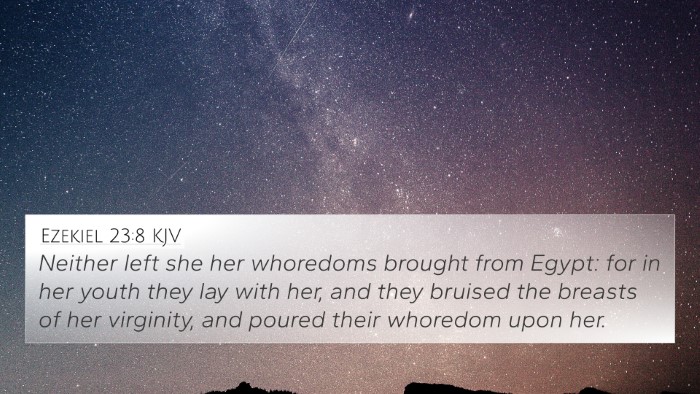Understanding Nehemiah 13:18
Nehemiah 13:18 states: "Did not your fathers thus, and did not our God bring all this evil upon us, and upon this city? Yet ye bring more wrath upon Israel by profaning the sabbath." This verse addresses the consequences of neglecting God's commandments, particularly regarding the observance of the Sabbath.
Contextual Interpretation
This verse is situated in a narrative where Nehemiah is confronting the people of Israel for their actions that led them away from God's ordinances. The historical backdrop is crucial, as it illuminates the struggles of the Israelites post-exile and their need for spiritual renewal.
Commentary Insights
- Matthew Henry's Commentary: Henry emphasizes that the Israelites had a history of disobedience leading to divine punishment. Their failure to keep the Sabbath and other laws resulted in God's wrath, which was evident through their hardships.
- Albert Barnes' Notes: Barnes points out that Nehemiah is reminding the people of their fathers' failures, showing them the importance of learning from past mistakes. The Sabbath is portrayed as a critical institution meant to keep the nation spiritually aligned and prevent further consequences.
- Adam Clarke's Commentary: Clarke discusses the significance of the Sabbath as a sign of the covenant between God and His people. He notes that the profaning of the Sabbath would provoke God's anger, linking the faithfulness of the people to their well-being.
Bible Cross-References
This verse connects with several other scriptures, offering deeper insights into its meaning and implications:
- Exodus 20:8-11: Instructions on keeping the Sabbath holy.
- Isaiah 58:13-14: Promises for those who honor the Sabbath.
- Jeremiah 17:27: Warning against carrying burdens on the Sabbath.
- Ezekiel 20:12: The Sabbath as a sign of God's covenant.
- Mark 2:27: Jesus stating the Sabbath was made for man, indicating its purpose.
- Hebrews 4:9-10: Spiritual rest linked to the Sabbath concept.
- Matthew 12:8: Declaring Himself Lord of the Sabbath, reinforcing its significance.
Thematic Connections
This verse illustrates broader themes found throughout Scripture, including:
- Divine Judgment: The consequences of turning away from God's commands are a recurrent theme. Nehemiah highlights that the failures of the past lead to present afflictions.
- Restoration: God's desire for His people to return to Him and observe His laws demonstrates the theme of restoration.
- The Importance of Tradition: The remembrance of past failures is essential for current obedience, emphasizing the transmission of faith through generations.
Applications for Today
This verse is not merely historical; it carries timeless principles applicable for modern believers:
- Observance of Rest: The concept of taking a Sabbath invites believers to rest and reflect, underscoring work-life balance as essential to spiritual health.
- Learning from History: It teaches the importance of understanding the consequences of disobedience and striving for adherence to God's commandments.
- Community Conduct: The reminder to uphold the honor of God's laws serves as a guide for communal integrity and accountability.
Conclusion
Nehemiah 13:18 serves as a poignant reminder of the importance of fidelity to God's laws, particularly regarding the observance of the Sabbath. By understanding its historical context and the commentary insights, one can appreciate the profound implications this verse holds not only for the Israelites but also for contemporary believers. Through cross-referencing with related Scriptures, deeper themes emerge, allowing for a better grasp of God's covenantal relationship with His people.
SEO Keywords Integration
This analysis features various Bible verse cross-references that relate to Nehemiah 13:18, as well as insights into the connections between Bible verses and the thematic Bible verse connections that arise throughout the commentary. Tools for Bible cross-referencing can further enhance understanding when studying these significant themes.














